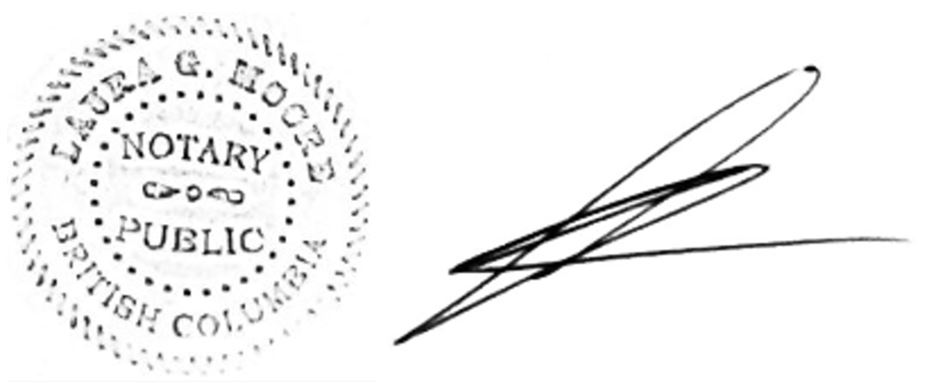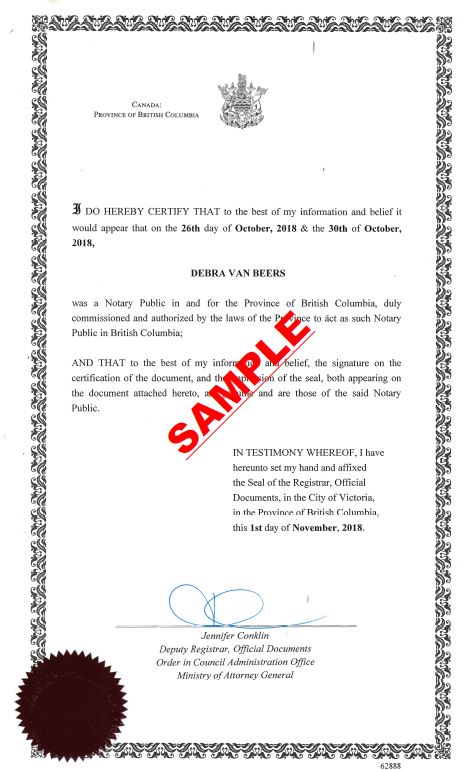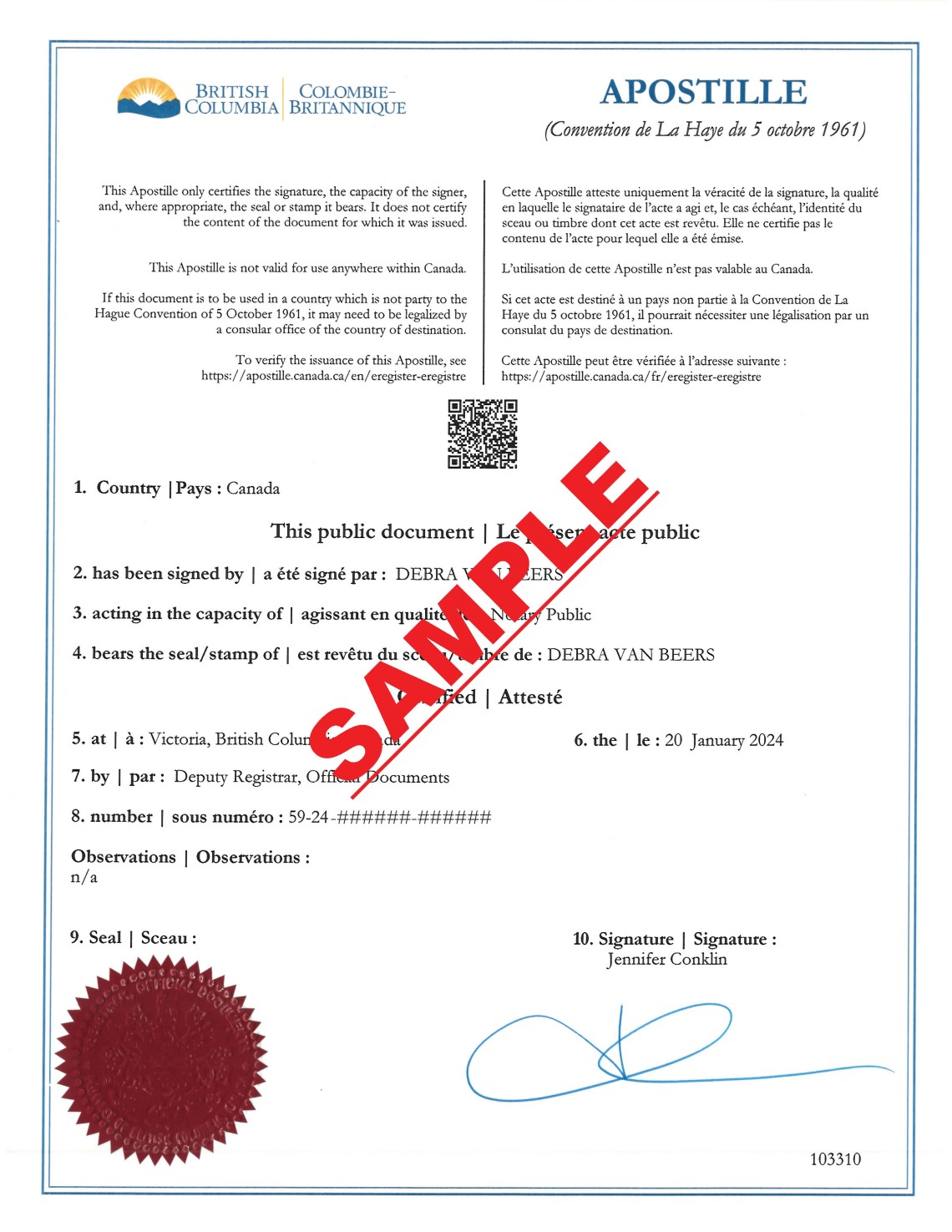About Authentication
Apostille Convention
The Apostille Convention came into effect in Canada on January 11, 2024. An authentication certificate called an "apostille" is attached to all documents that have been authenticated in B.C. on or after January 11, 2024. See Apostille Convention for details.
This site will guide you through the process of having a B.C. public document authenticated by the Government of British Columbia for use outside of Canada.
On this page:
- What is authentication?
- Why might a B.C. public document need to be authenticated?
- Is my document eligible for authentication in B.C.?
- What are the steps in the process?
- Does my document need to be translated before authentication?
- Does my document need to be notarized before authentication?
- Does my document need to be legalized after authentication?
- Documents from B.C. public education institutions
- Do you need my photo ID or other supporting documents?
- How much does authentication in B.C. cost?
What is authentication?
B.C. public documents often show the signature (and, if applicable, the seal) of the issuer or of a lawyer, notary or other official.
Notary signature and seal

Through the authentication process (sometimes called “legalization” or “apostille”):
- The signature and seal on the public document are confirmed as genuine
- The authority of the issuer, lawyer, notary or other official to sign at the time of signing is confirmed
The authentication process does not confirm or certify the contents of the B.C. public document.
B.C. public documents authenticated in British Columbia can be identified by the authentication certificate riveted (physically attached with hole punch and rivet) to them. The certificate attached to documents authenticated in B.C. on or after January 11, 2024 is called an "apostille". See below for sample images of certificates issued for documents authenticated in B.C. before and after January 11, 2024.
Provincial authentication certificate issued before January 11, 2024 (notary)

Provincial authentication certificate ("apostille") issued on or after January 11, 2024 (notary)

In British Columbia, public documents are authenticated by the Registrar, Official Documents, or Deputy Registrar, Official Documents, in the Order in Council (OIC) Administration Office.
Note that the B.C. Authentication Program is not the same as the federal authentication of documents service offered by Global Affairs Canada. Please check with the consulate, embassy or country that you are dealing with to ensure that you get the type of authentication they will accept.
Why might a B.C. public document need to be authenticated?
A government or organization of a country outside Canada may need one or more of your B.C. public documents to be authenticated before it will be accepted for use there. Authentication provides the government or organizations with confidence that the signature and seal on the document are genuine.
Is my document eligible for authentication in B.C.?
Documents that are eligible for authentication in B.C. must be either:
- B.C. public documents, submitted in the format required, for use outside Canada
- Certain federal Canadian public documents that have been notarized in B.C., submitted in the format required, for use outside Canada (see B.C. Notarized Documents)
If you have a Canadian public document that was issued in a province or territory other than B.C. (even if the document is notarized in B.C.), visit the Global Affairs Canada website for information on how to get your document authenticated for use abroad.
The B.C. Authentication Program is unable to authenticate foreign documents (documents issued outside Canada) for use abroad.
If you have a foreign document and need it authenticated for use abroad, we recommend that you contact the embassy, high commission or consulate in Canada of the country of issuance.
What are the steps in the process?
The steps depend on:
- which country needs the authenticated document, and
- what type of B.C. public document is being authenticated
Before preparing your document for authentication, always check first with the embassy or consulate of the destination country regarding what documents you need and what other steps you may need to take.
The possible steps may include (as applicable):

Does my document need to be translated before authentication?
If all or part of your document is in a language other than English, it must be translated according to the translation requirements. Most B.C. public documents do not need to be translated.
If your document needs to be translated, it must also be notarized and returned as a set with the translation. You are strongly advised to check with your notary or lawyer before sending your document to be translated and involve them in the translation process.
Does my document need to be notarized before authentication?
Not all types of public documents need to be notarized before authentication.
If your document needs to be notarized before authentication, it must be notarized by a B.C. Notary Public (B.C. lawyer or B.C. non-lawyer) who is already on file with our office to avoid delays. See also Information for B.C. Lawyers and Notaries.
Some types of public documents should not be notarized before authentication. Review instructions on this website to find out if your document type should be submitted for authentication as a non-notarized original document.
Does my document need to be legalized after authentication?
For documents authenticated in B.C. on or after January 11, 2024, if the destination country is a member of the Hague Apostille Convention, then the apostille certificate (authentication certificate) does not need to be legalized by a consular office of the country of destination.
Always check first with the embassy or consulate of the destination country regarding what documents you need and what other steps you may need to take.
For more information, see Apostille Convention.
Documents from B.C. public education institutions
If your B.C. Education Document (K-12 or Post Secondary) was issued by a B.C. public education institution instead of the Ministry of Education, please contact us first to find out which signatories are already on file with our office.
Do you need my photo ID or other supporting documents?
No, our office does not need to see your identification or other supporting documents. Please only include documents that you want authenticated.
How much does authentication cost?
The fee is $20 per document authenticated. Please refer to Document Authentication Fee for details.
Email: BCAuthentication@gov.bc.ca
Mail/Courier Address:
Ministry of Attorney General
OIC Administration Office
Attention: BC Authentication Program
1001 Douglas Street
Victoria, BC V8W 2C5
